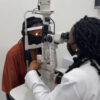LUTEIN AND ZEAXANTHIN
LUTEIN AND ZEAXANTHIN are powerful antioxidants that defend your body against unstable molecules called free radicals. They are important carotenoids, potent antioxidants that offer a range of health benefits, and they are best known for protecting our eyes.
WHAT IS AN ANTIOXIDANT?
Antioxidants are substances that can prevent/slow down damage to cells caused by free radicals, unstable molecules that the body produces as a reaction to the environment, and other pressures. Antioxidants are also known as a free-radical scavenger.
IMPORTANCE OF ANTIOXIDANTS
Adding powerful vitamins, antioxidants, and minerals to our diet can improve our vision and overall eye health. EYE-friendly nutrients such as LUTEIN and ZEAXANTHIN, Vitamin C, Vitamin E, and Zinc plays vital roles in reducing the risks of developing certain eye diseases like cataract, age-related macular degeneration, etc.
You can find these antioxidants in green leafy vegetables, fruits, nuts, and a lot of other foods. Who knew taking care of your eyes could taste good too.

IMPORTANCE OF LUTEIN AND ZEAXANTHIN TO THE EYES
They are the only dietary carotenoids that accumulate in the retina, especially in the macula region. The macula is located at the back of the eye and it’s the macula that is responsible for our central vision, most of our color vision, and the fine detail we see. Safe to say the macula is essential for our vision.
They protect the macula by protecting the eyes from harmful free radicals. A high level of lutein and zeaxanthin in both eyes results in better vision, especially in dim light or where glare is a problem.
They also act as natural sunblock by absorbing excess light energy, they protect your eyes from harmful high-energy light waves like the ultraviolet rays in sunlight and harmful blue light.
Below are some conditions with which LUTEIN AND zeaxanthin may help;
- Age-related macular degeneration: Consumption of lutein and zeaxanthin may protect against AMD progression to blindness.
- Cataracts: They may slow the formation of cataracts.
- Diabetic retinopathy: They have been shown to reduce oxidative stress markers that damage the eyes.
- Uveitis: May help reduce the inflammatory process involved.




